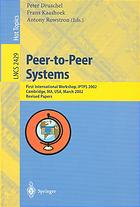

Most ebook files are in PDF format, so you can easily read them using various software such as Foxit Reader or directly on the Google Chrome browser.
Some ebook files are released by publishers in other formats such as .awz, .mobi, .epub, .fb2, etc. You may need to install specific software to read these formats on mobile/PC, such as Calibre.
Please read the tutorial at this link: https://ebookbell.com/faq
We offer FREE conversion to the popular formats you request; however, this may take some time. Therefore, right after payment, please email us, and we will try to provide the service as quickly as possible.
For some exceptional file formats or broken links (if any), please refrain from opening any disputes. Instead, email us first, and we will try to assist within a maximum of 6 hours.
EbookBell Team

0.0
0 reviewsPeer-to-peer has emerged as a promising new paradigm for large-scale distributed computing. The International Workshop on Peer-to-Peer Systems (IPTPS) aimed to provide a forum for researchers active in peer-to-peer computing to discuss the state of the art and to identify key research challenges. The goal of the workshop was to examine peer-to-peer technologies, appli- tions, and systems, and also to identify key research issues and challenges that lie ahead. In the context of this workshop, peer-to-peer systems were characterized as being decentralized, self-organizing distributed systems, in which all or most communication is symmetric. The program of the workshop was a combination of invited talks, pres- tations of position papers, and discussions covering novel peer-to-peer appli- tions and systems, peer-to-peer infrastructure, security in peer-to-peer systems, anonymity and anti-censorship, performance of peer-to-peer systems, and wo- load characterization for peer-to-peer systems. To ensure a productive workshop environment, attendance was limited to 55 participants. Each potential participant was asked to submit a position paper of 5 pages that exposed a new problem, advocated a speci?c solution, or reported on actual experience. We received 99 submissions and were able to accept 31. Participants were invited based on the originality, technical merit, and topical relevance of their submissions, as well as the likelihood that the ideas expressed in their submissions would lead to insightful technical discussions at the workshop.